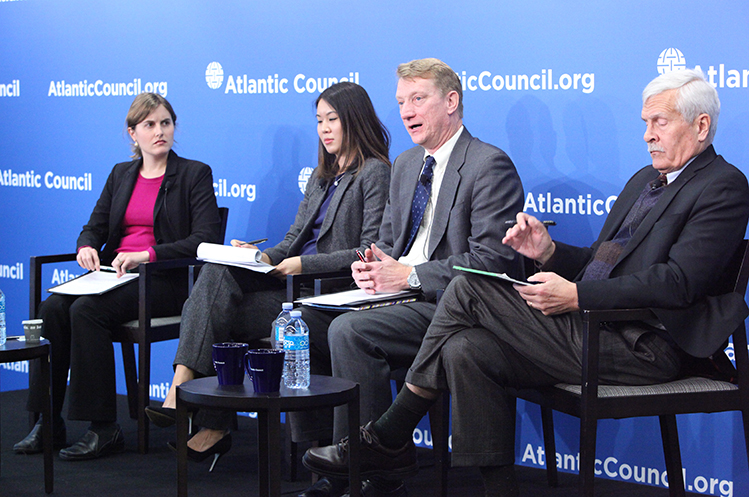 China-Taiwan relations have warmed significantly as a consequence of increased economic interdependence, but some analysts believe that Beijing may ultimately use force to settle the issue of Taiwan’s sovereignty.
China-Taiwan relations have warmed significantly as a consequence of increased economic interdependence, but some analysts believe that Beijing may ultimately use force to settle the issue of Taiwan’s sovereignty.
The election in January of Taiwan’s first female President, Tsai Ing-wen, who leads the pro-independence Democratic Progressive Party, has been viewed warily by Beijing. Soon after Tsai’s election, China’s state-run media warned Taiwan to abandon “hallucinations” about independence. Beijing asserts that there is only “One China” of which Taiwan is an inalienable part. President-elect Tsai has vowed to preserve the status quo in relations with Beijing.
“[T]he status of Taiwan remains unresolved and the possibility of the use of force [by China] to resolve this issue is not entirely off the table,” said Tiffany Ma, Director of Political and Security Affairs at the National Bureau of Asian Research.
The current status quo between China and Taiwan could be disrupted by three factors, according to Ma: continued economic instability in China; political turmoil in the Chinese Communist Party; and increased perceptions of threat from a US role in the region.
“Significant economic deterioration stemming from ethno-religious turmoil in the western Chinese provinces…and the combination of impatience, on Beijing’s part with other regional actors, with China’s military growth” could possibly lead to an outright Chinese force deployment against Taiwan, Ma said.
In 1979, US President Jimmy Carter signed the Taiwan Relations Act, which obligates the United States to give Taiwan the means to defend itself should it ever come under attack from China.
Ma spoke on February 9 at an Atlantic Council event hosted by the Brent Scowcroft Center on International Security as a part of its Cross-Straits Event Series. Ma was joined by Roger Cliff, a Nonresident Senior Fellow at the Scowcroft Center and Thomas McNaugher, Director of Security Studies at Georgetown University. Shannon Tiezzi, Managing Editor at The Diplomat, moderated the discussion.
Even though the military option technically remains on the table, it doesn’t stand as a sound one.
Economic integration and the one-hundred-mile distance between Taiwan and the mainland are key deterrents for any military operation to take flight, according to McNaugher.
“There is a powerful incentive for China to focus on non-military options” in its dealings with Taiwan, McNaugher noted.
When it comes to the military arm of Beijing’s foreign policy, “China has one major focus: keep up with the United States. They don’t like being in second place,” he added.
Taiwan’s political climate has always been defined by the questions of state independence and national identity in relation to its mainland neighbor of China. Tsai’s election on January 16 has galvanized the debate around independence from the mainland and Taiwanese identity.
Continued pro-independence sentiment in Taiwan could further pressure China to upset the status quo. “Polling in Taiwan shows that there has been a generational shift of people in Taiwan identifying themselves away from the mainland,” Ma said.
A recent poll by Taiwan’s National Chengchi University found that a record 59 percent of respondents identified as Taiwanese, while only 34 percent said they were both Taiwanese and Chinese. This is a change from 1992, when a similar survey found 18 percent of respondents identified as Taiwanese only.
Tsai’s predecessor, Ma Ying-jeou of the Kuomintang party, led an unprecedented effort to mend ties with Beijing. This produced an increase in cross-strait flights and trade deals. However, not everyone on the island shared the government’s enthusiasm for closer ties to mainland China. A service trade pact sparked the 2014 Sunflower protest movement in Taiwan.
The Chinese-Taiwan security question has taken a back seat even as the United States is paying greater attention to the Asia Pacific because of North Korea’s recent nuclear and missile tests, Chinese economic shocks, and Trans-Pacific Partnership (TPP) trade negotiations. Chinese President Xi Jinping is expected to visit Washington in March to participate in the Nuclear Security Summit.
Regarding the possibility of Chinese-Taiwan unification, Ma concluded that there are “three broad regional factors the [international community] must consider going forward: first, the role of Japan as a key US ally and how that will play into Japan-Taiwan relations; second, how will the rest of Southeast Asia view warming US-China relations; and third, how will China’s regional territorial disputes influence the policy of otherwise quiet Southeast Asia states.”
“Beijing’s belief of inevitable unification stems from the belief that time is on its side…It is not giving up on its goals anytime soon,” she said.
Mitch Hulse is an intern at the Atlantic Council.
Image: From left: Shannon Tiezzi, Managing Editor of The Diplomat, moderates a discussion at the Atlantic Council on February 9 with Tiffany Ma, Director of Political and Security Affairs at the National Bureau of Asian Research; Roger Cliff, a Nonresident Senior Fellow at the Council’s Brent Scowcroft Center on International Security; and Thomas McNaugher, Director of Security Studies at Georgetown University. (Atlantic Council/Victoria Langton)

